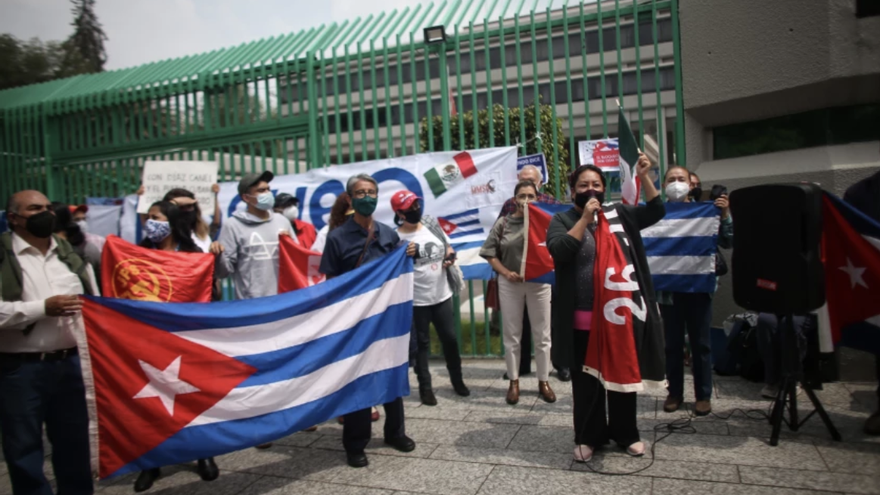
![]() 14ymedio, Madrid, 13 July 2021 — Raúl Castro, who is supposed to be out of power since he resigned as first secretary of the Communist Party of Cuba (PCC) in the last Congress, reappeared this Monday, according to official media, at a meeting of the Political Bureau to address the massive protests that started on Sunday.
14ymedio, Madrid, 13 July 2021 — Raúl Castro, who is supposed to be out of power since he resigned as first secretary of the Communist Party of Cuba (PCC) in the last Congress, reappeared this Monday, according to official media, at a meeting of the Political Bureau to address the massive protests that started on Sunday.
Chaired by the current first secretary of the PCC and designated president Miguel Díaz-Canel, it “analyzed the provocations orchestrated by counterrevolutionary elements, organized and financed from the United States with destabilizing purposes,” says the official press, which does not offer any image of the former president.
“The members of the highest party organ also addressed the exemplary response of the people to the call of comrade Díaz-Canel to defend the Revolution in the streets, which allowed the subversive actions to be defeated,” the report added.
Not one iota of self-criticism is perceived at the top of the Cuban power structure. Thus, in his television appearance on Monday, Díaz-Canel once again blamed the United States for destabilizing the country through a “media campaign” on social networks and independent media.
The number of deaths, wounded, detained and disappeared by the State Security after the demonstrations, which continued to take place this Monday, is uncertain, but the testimonies from ordinary citizens have multiplied these numbers.
The usual allies, notably Venezuela and Nicaragua, but also Argentina, Mexico and Russia, spoke in favor of the regime and against the sanctions of the United States.
The Venezuelan president, Nicolás Maduro, was one of the first to call Díaz-Canel and show his support in the face of the protests.
“From this dialogue table and this presidential palace, I ratify, as I said yesterday by phone, to President Miguel Díaz-Canel all the support of the Bolivarian Republic of Venezuela to the people of Cuba, to the revolutionary government of Cuba,” said Maduro this Monday in a ceremony with a minority group of the opposition.
To Cuba, he said, “they have applied the same method of suffocation, of persecution for 60 years,” and asked, following the island’s propaganda: “If the United States and the extremist opponents in Cuba really want to alleviate and help the people of Cuba, let them immediately lift all sanctions and the blockade against the people of Cuba.”
From Nicaragua, the marriage formed by Daniel Ortega and Rosario Murillo also contacted the Cuban president to express their support. Murillo even compared the anti-government demonstrations on the island on Sunday with those experienced by Nicaragua in April 2018, and accused the United States of using in Cuba “that same format that we knew.”
Those protests, classified by the Nicaraguan Executive as an “attempted coup,” left at least 328 dead, according to the Inter-American Commission on Human Rights (IACHR), although local organizations raise the figure to 684 and the Government recognizes 200.
Murillo offered his words just hours after the United States revoked the US visas of 100 legislators, prosecutors, judges and other officials of the Nicaraguan Judicial Power, for facilitating “the regime’s assaults on democracy and human rights.”
For its part, Russia expressed, through its Ministry of Foreign Affairs, that it is “following the development” of the situation in Cuba while stating that any attempt to “destabilize the country from abroad” is “unacceptable,” referring to a alleged interference by the United States. For the Russian Foreign Ministry, “the Cuban authorities are taking all the necessary measures to restore public order for the benefit of their citizens.”
In similar terms, the president of Mexico, Andrés Manuel López Obrador, expressed his “solidarity with the Cuban people,” urging them to seek “a solution through dialogue, without the use of force, without confrontation, without violence.” At the same time, he criticized the “unusual information display” of the Cuban protests promoted “by those who do not agree with the policies of the Government of Cuba” and asked the United States “to suspend the blockade.”
The opinion of the president of Argentina, Alberto Fernández, was the same. “I do not know exactly the dimension of the Cuban problem,” he declared. “What I am clear about, as Andrés Manuel López Obrador said, is that if we are really concerned with Cuba in a humanitarian sense, let’s end the blockades.”
Asked about the demands expressed in the protests registered this Sunday in Cuba, Fernández said that “all these things are problems that the peoples have to solve.”
On the other hand, the president of the House Foreign Affairs Committee of the United States Congress, Democrat Gregory Meeks, asked President Joe Biden on Monday to lift the economic sanctions against Cuba imposed by his predecessor, Donald Trump.
“Cubans face great difficulties due to the economic and health impacts of COVID-19, the entrenched culture of corruption and mismanagement among Cuban leaders and the strict sanctions cruelly imposed by the Trump Administration,” Meeks said in a statement.
“I call on President Biden to help alleviate the suffering in Cuba by rescinding the sanctions,” added the congressman, who declared that “Cubans are angry and have every right to express their frustrations and participate in peaceful protests” and warned that “basic freedoms must be respected, not punished.”
Biden was asked on Monday when he would be willing to change Trump’s Cuba policy, but he avoided answering. “We will have more to say about Cuba and Haiti as this week progresses. Stay tuned.”
COLLABORATE WITH OUR WORK: The 14ymedio team is committed to practicing serious journalism that reflects Cuba’s reality in all its depth. Thank you for joining us on this long journey. We invite you to continue supporting us by becoming a member of 14ymedio now. Together we can continue transforming journalism in Cuba.
